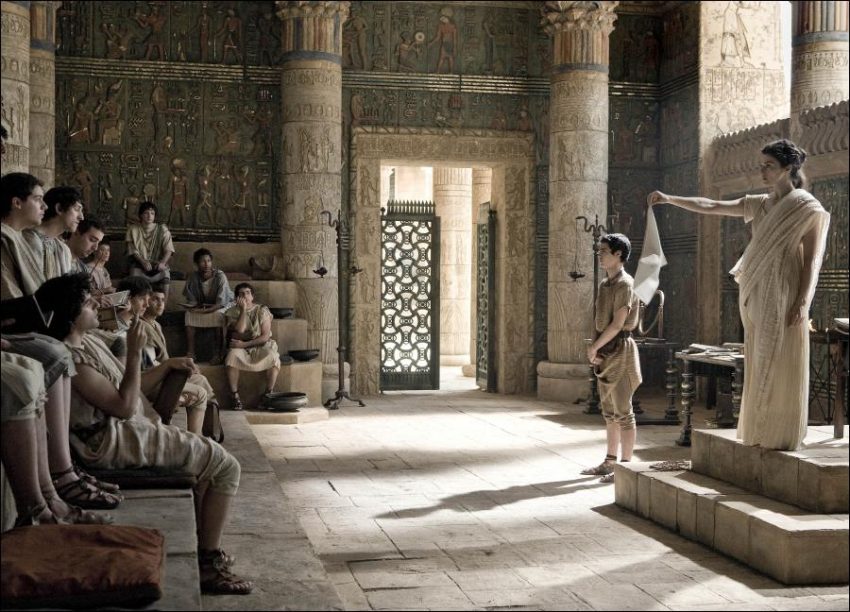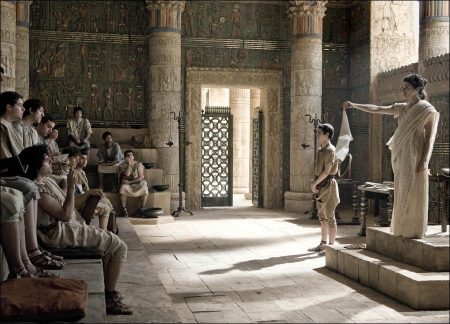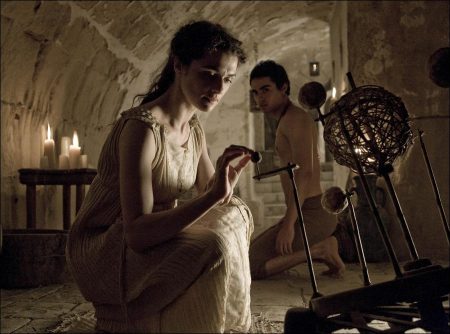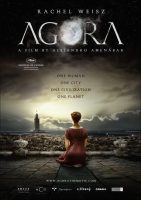Taglines: Alexandria, Egypt. 391 A.D. The world changed forever.
Alexandria, 391 AD: Hypatia teaches astronomy, mathematics, and philosophy. Her student Orestes is in love with her, as is Davus, her personal slave. As the city’s Christians, led by Ammonius and Cyril, gain political power, the institutions of learning may crumble along with the governance of slavery.
Jump ahead 20 years: Orestes, the city’s prefect, has an uneasy peace with Christians, led by Cyril. A group from the newly empowered Christians has now taken to enforce their cultural hegemony zealously; first they see the Jews as their obstacle, then nonbelievers. Hypatia has no interest in faith; she’s concerned about the movement of celestial bodies and “the brotherhood of all”. Although her former slave doesn’t see it that way.
Agora (Spanish: Ágora) is a 2009 Spanish English-language historical drama film directed by Alejandro Amenábar and written by Amenábar and Mateo Gil. The biopic stars Rachel Weisz as Hypatia, a female mathematician, philosopher and astronomer in late 4th-century Roman Egypt, who investigates the flaws of the geocentric Ptolemaic system and the heliocentric model that challenges it. Surrounded by religious turmoil and social unrest, Hypatia struggles to save the knowledge of classical antiquity from destruction. Max Minghella co-stars as Davus, Hypatia’s father’s slave, and Oscar Isaac as Hypatia’s student, and later prefect of Alexandria, Orestes.
The story uses historical fiction to highlight the relationship between religion and science at the time amidst the decline of Greco-Roman polytheism and the Christianization of the Roman Empire. The title of the film takes its name from the agora, a gathering place in ancient Greece, similar to the Roman forum. The film was produced by Fernando Bovaira and shot on the island of Malta from March to June 2008. Justin Pollard, co-author of The Rise and Fall of Alexandria (2007), was the historical adviser for the film.
Agora was screened out of competition at the 2009 Cannes Film Festival in May, and opened in Spain on October 9, 2009 becoming the highest-grossing film of the year for that country. Although the film had difficulty finding distribution, it was released country by country throughout late 2009 and early 2010. The film received a 53% overall approval rating from Rotten Tomatoes and seven Goya Awards in Spain, including Best Original Screenplay. It was awarded the Alfred P. Sloan Foundation Feature Film Prize at the Hamptons International Film Festival.
Principal photography began on March 17, 2008, on the island of Malta, and was scheduled to last 15 weeks. Production designer Guy Hendrix Dyas used large sets on location instead of computer generated imagery at Amenábar’s direction. The construction of the set employed almost 400 people, and was the largest ever designed on the island. Actor Charles Thake (Hesiquius) suffered minor facial injuries on the set when he collided with extras running during a scene.[15] Filming ended in June.
Continue Reading and View the Theatrical Trailer
Agora (2010)
Directed by: Alejandro Amenábar
Starring by: Rachel Weisz, Max Minghella, Oscar Isaac, Ashraf Barhom, Michael Londsdale, Amber Rose Revah, Rupert Evans, Homayoun Ershadi, Sami Samir, Manuel Cauchi, Yousef ‘Joe’ Sweid, Oshri Cohen
Screenplay by: Alejandro Amenábar
Production Design by: Guy Hendrix Dyas
Cinematography by: Xavi Giménez
Film Editing by: Nacho Ruiz Capillas
Costume Design by: Gabriella Pescucci
Set Decoration by: Larry Dias
Art Direction by: Matthew Gray, Stuart Kearns, Jason Knox-Johnston, Frank Walsh
Music by: Dario Marianelli
MPAA Rating: R for some violence.
Distributed by: Newmarket Films
Release Date: May 28, 2010



